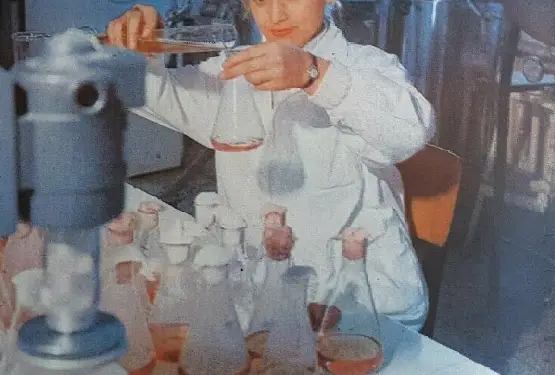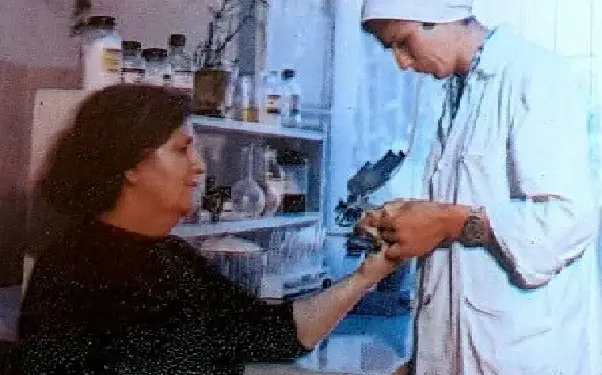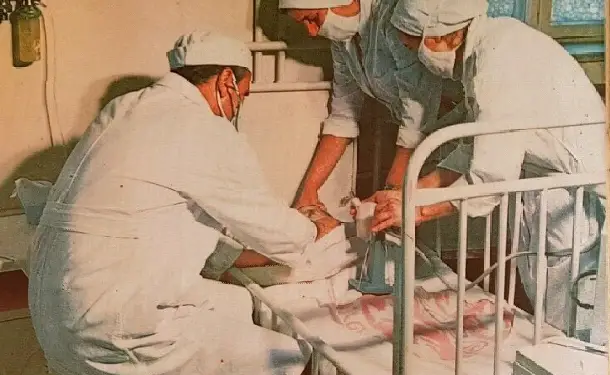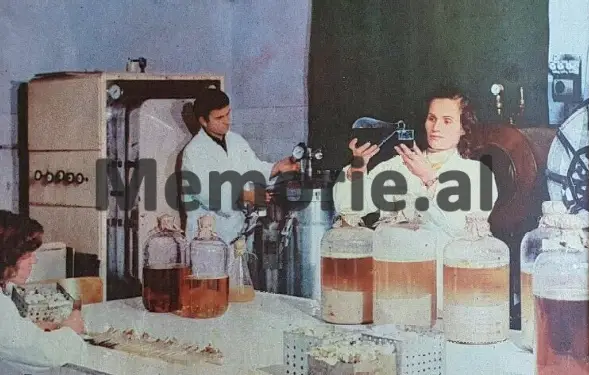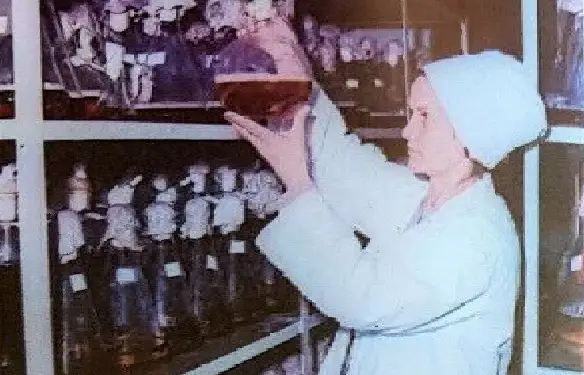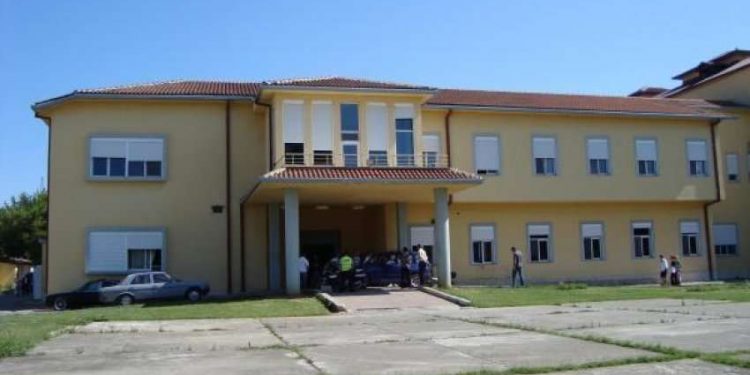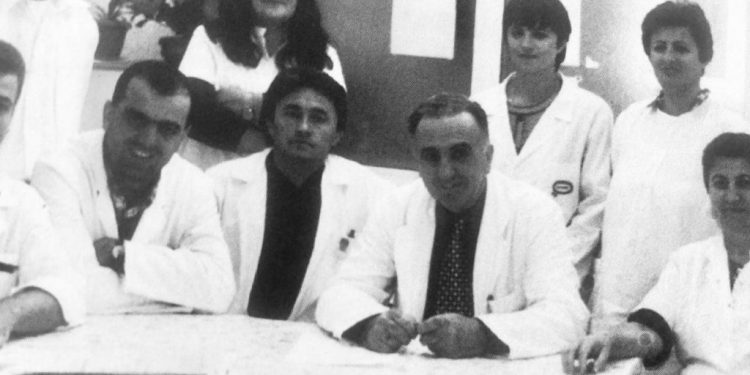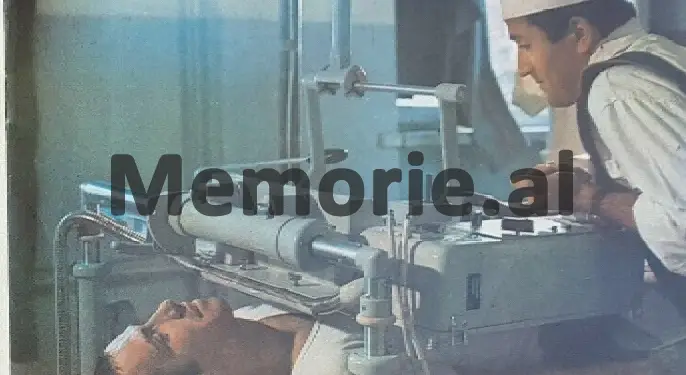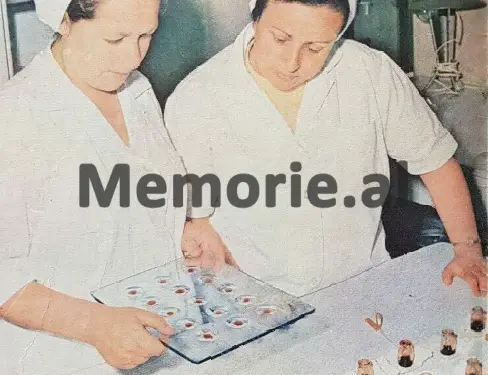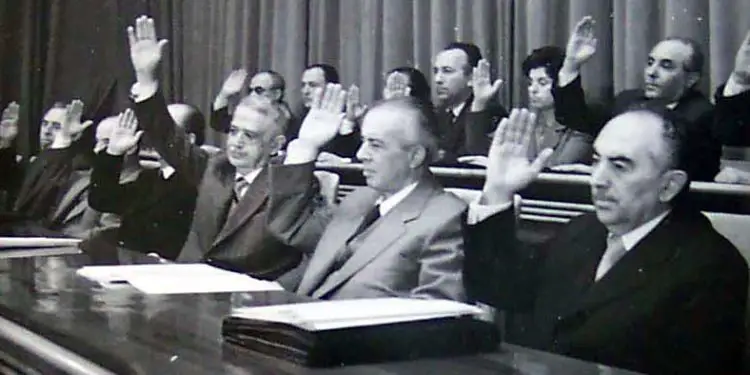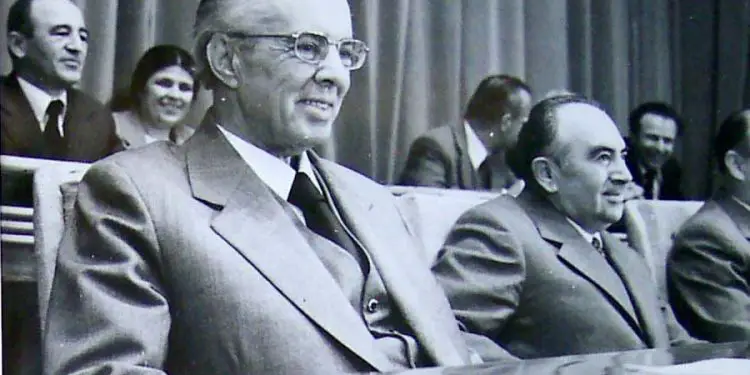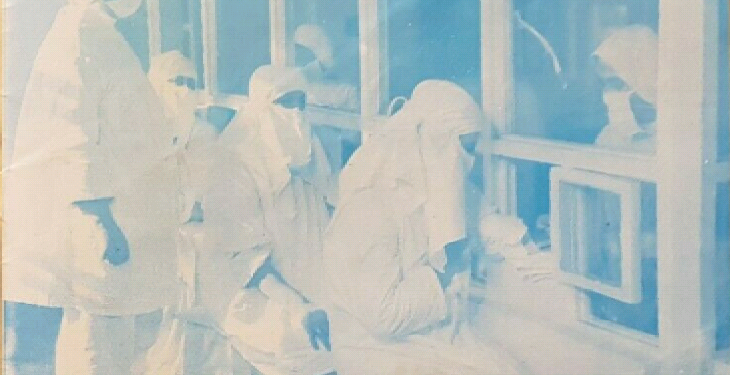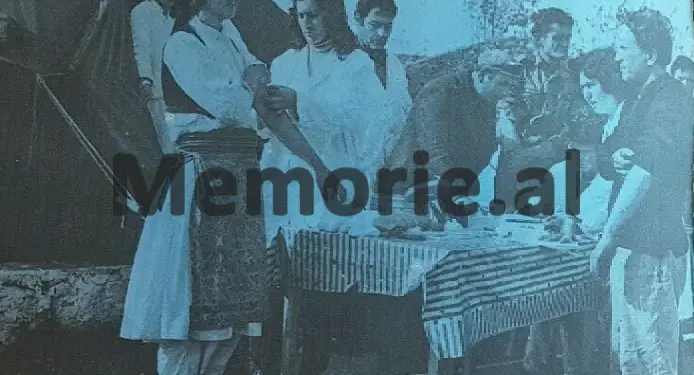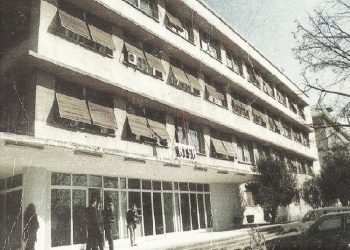Memorie.al publishes an archival document issued by the fund of the former Central Committee of the SPL, which refers to the 11th Plenum of the Central Committee held on January 26, 1971, where it was analyzed and analyzed. long discussed the report held by the Political Bureau of the Central Committee on “The situation and measures to be taken to raise the level of health care, especially prophylaxis and hygiene”, held by a member of the Political Bureau and Deputy / Chairman of the Council of Ministers of the People’s Republic of Albania, Adil Carçani. In his speech, after identifying “the great achievements that were made after the liberation with the eradication of some infectious diseases such as malaria, syphilis, and tuberculosis, as well as increasing the average age and decreasing infant mortality, which had come thanks to the just Marxist-Leninist policy of the ASP ”, set out tasks for the future in order to raise the level of health service for the protection of the health of the people.
Even during the period of Enver Hoxha’s communist regime before the 1990s, the senior leadership of the ASP raised the issue of hygiene and the measures to be taken to increase the levels of health care and prophylaxis for prevention. diseases, especially contagious diseases such as malaria, syphilis, and tuberculosis, which were said to “kill before the liberation”.
One of those meetings of the Central Committee of the APL where the issue of health care and population hygiene was raised and discussed was the 11th Plenum held on January 26, 1971, where the report on the topic: “On the situation and measures to be taken to raise the level of health care, especially prophylaxis and hygiene”, was held by the member of the Political Bureau of the Central Committee of the PLA and Deputy Chairman of the Council of Ministers of the PLA, Adil Carçani. It is not known precisely whether the topic in question had been previously planned to “increase the level of health care and hygiene and prophylaxis”, or whether it came as a result of the situation in some European countries at that time, due to of the declining Cholera epidemic, where its epicenter was in Odesa, the Soviet Union, where it had a major outbreak.
It was said that the disease called “El Tor” which started the “Seventh Cholera Pandemic”, first opened in Indonesia in 1961 and then spread to Bangladesh where it continued until 1963, to move from there to India in 1964 and under the domino effect spread to the Soviet Union in 1966. The peak of that epidemic came with the outbreak in Odessa in July 1970 and in Baku in 1972, but that Moscow the official of that time kept it a secret, as was the case with all the countries of the Communist East. In the early 1970s, that epidemic, after several outbreaks in Japan and the South Pacific, spread to North Africa, and from there reached Italy in 1973. In 1971, the number of cases reported around the world, reportedly reaching 155,000.
Given this situation in a part of the world, where Albania was in danger of being surrounded by the USSR east and the west by Italy, it was most likely discussed at the Plenum of 26 January 1971…
Regarding what was said in that report held in that Plenum, on the state of health care in Albania and the measures to be taken in the future, the document in question that Memorie.al is publishing is complete and without any pruning.
DECISION OF THE PLENUM OF THE CENTRAL APL COMMITTEE
ON THE SITUATION AND MEASURES TO BE TAKEN TO A HIGHER LEVEL OF SIDOMOS PROFILAXINE HEALTH AND HYGIENE
January 26, 1971
11th Plenum of the Central Committee of the LLP, convened on 25-26 January 1971, after hearing and discussing the report of the Political Committee of the Central Committee «On the Situation and Measures to be Raised to Increase the Health Service, especially prophylaxis and hygiene », held by a member of the Political Bureau of the Central Committee of the PLA and Deputy Chairman of the Council of Ministers of the PLA, Comrade Adil Charçani,
During these 26 years of popular rule, great successes have been achieved in the field of protecting and strengthening the health of the people. Today the average life of the population has reached 68 years, up from 38 that was before liberation; malaria, syphilis, which in the past wiped out the widespread work masses, have finally disappeared, as tuberculosis and other widespread diseases are now largely restricted. The deaths per thousand people here have reached the lowest levels known in Europe, while the natural population growth is among the highest. All this testifies, among other things, to the just Marxist-Leninist policy of the Party, to the great efforts of the broad masses of the people, and to the tireless and conscientious work of the health workers, as a right to the importance of prophylactic measures. , as the basis for strengthening and protecting the health of the people. Lifestyle and working conditions, especially in some villages, do not meet hygiene requirements. There is still insufficient care for maternal and child problems and the deaths of children aged 0-1, in some areas are still high. In many prophylactic and medical health institutions, the organization of work and the level of health service are not up to par. To raise the fight for the protection and strengthening of the health of the people to a higher level, the Plenum of the Central Committee of the Labor Party of Albania, on the issue of protection and strengthening of the health of the people, is still flawed.
decided:
TO BE EVALUATED AND PROMOTED TO A HIGHER LEVEL PROPHYLACTIC WORK ON PROTECTION AND STRENGTHENING PEOPLE’S HEALTH
The problems of protecting and strengthening the health of the people have an important social and political character and their successful resolution requires mobilization and organized work in all directions. It is necessary to understand deeply politically and scientifically by all, and first and foremost by health workers, the prophylactic orientation that the Party has given to health, which combines the best in perfecting the health service and raising it to a higher level. scientific participation, with the direct participation of the masses in protecting and strengthening the health of the people, so that everyone is interested in their health, in the health of their families, in the health of society. Therefore, Party and mass organizations, state and economic bodies, and in particular health workers, should develop a broader educational and propaganda work with staff measures for the full and comprehensive evaluation of prophylactic measures in the protection of health, and for health. continuous physical measures to further improve the way of life and working conditions, in a struggle incompatible with the concepts and customs everywhere, especially in the countryside.
In the context of prophylaxis, particular care should be taken of both personal and collective hygiene. Propaganda and education work to deeply embody in the consciousness of people the love of hygiene and cleanliness and to create an atmosphere incompatible with any appearance of impurity and violation of hygienic-sanitary rules. In this regard, the full utilization and regular attendance of facilities set up in agricultural cooperatives such as baths, laundry, other measures to improve housing conditions and the fight against any source of infection are some of the most pressing tasks today. for the health workers, for the organs and organizations of the Party and the masses, for the organs of power and economy, especially in the countryside.
In labor and production centers, greater attention is paid to occupational hygiene and prophylactic measures to protect the health of workers. With the actions of the employees of these centers, relying mainly on their own forces, to take measures to improve their working environments, their good ventilation, and lighting, and to reduce the harmful effects of the technological processes that bring about increased temporary incapacity for work. Health institutions and the Ministry of Health conduct special studies related to a variety of occupational diseases, such as lung, skin, kidney disease. etc. caused by dust and chemical substances and come up with scientific conclusions and concrete measures to be taken in this regard to improve the situation.
Health authorities and institutions in the center and districts pay more attention to the fight against a range of diseases that are more common, such as digestive tract infections, communicable diseases, occupational diseases, as well as rickets and other dystrophies in children, carrying out more comprehensive studies and applying a range of prophylactic measures, such as screening, periodic mass screenings, vaccinations, etc.
Among the particular problems of hygiene and prophylaxis, the provision and preservation of drinking water from its infestations and injuries should be considered a first-rate problem, not only for health workers but also for public utilities and for themselves popular councils and leaders of agricultural cooperatives, especially in the fields and coastal areas. Ministries and various economic enterprises should pay particular attention and take concrete measures to purify industrial waters before they are discharged into the country’s reservoirs and rivers, to render them harmless to human, plant and animal life. animals.
In the range of prophylactic measures, for the protection of the health of the people, the continuous control of the relevant health organs and organs of the Professional Unions for the full implementation of the hygienic and sanitary rules, as in the production of articles, should be a matter of great importance. food and in their trading, especially in the social food network, in the canteens of workers, dormitories, etc.
In order to raise the level of prophylaxis in general and hygiene in particular, it is necessary to expand and improve sanitary propaganda with the broad working masses of the city and village, considering it a first-hand task, not only of the organs and health workers but of all Party organizations and measures, of the state and of the economic organs, which, by efficiently utilizing all means at their disposal, seeking and finding suitable forms, make sanitation education as deep as possible in people’s minds everywhere.
To accomplish all these tasks, Party-based organizations of masses, state economic bodies, and health institutions, from time to time organize and undertake mass actions with concrete objectives for the full hygiene of the village, neighborhoods, and centers. of work.
IMPROVE THE HEALTH SERVICE, INCREASE THE SCIENTIFIC LEVEL OF MEDICAL ASSISTANCE AND BRING IT TO THE PEOPLE
Pay more attention to the problems of a service organization in health institutions by strengthening leadership, control, on-duty awareness and care for the sick. Take all measures to ensure that the methods of analysis, diagnosis, and treatment are upgraded to respond to the opportunities and demands of the time, orienting themselves towards the most advanced methods achieved in the field of medicine.
Increase the level of medical assistance by raising the necessary specialized services for this purpose. Establishment of special emergency services, resuscitation, major burns, etc. in central institutions, and services of heart disease, orthopedics-traumatology, etc. in the main districts. Special attention should be paid especially to pediatric services in all health institutions, especially those in the village, aiming both at increasing the number of pediatricians and in providing general practitioners with the necessary knowledge of the pediatric profile… Also, organize a physical rehabilitation service for injured or chronically ill employees. Improve service and increase their capacity and utilization at thermal and hydro-power stations by conducting necessary studies on the quality and effectiveness of these resources.
Take measures to further expand the health service in the village, in order to bring it closer to the needs and requirements of the people. Make sure that each cooperative has a health center with the necessary medical personnel and in each village a maternity dispensary with a midwife. Provide these institutions with the tools and equipment needed to enhance the quality of medical care.
Strengthen medical service in polyclinics and ambulances. Strengthen their links with hospitals and extend their activity to home visits. To better monitor, the health of some categories of patients, starting this year, to better organize and expand their dispensaries. Emergency medical assistance should be organized at the appropriate level in key cities, providing the necessary staff and tools for this service.
To better organize the health service in the enterprises and work centers and to visit the doctors of the health institutions for the examination of the employees and for the hygienic-sanitary control of the measures in the working premises. Health authorities should take measures to expand the number of ambulances in enterprises and periodic health check-ups in schools.
Take measures to better organize the production of a variety of medical tools, equipment, and medical and curative equipment in various plants and enterprises of the country, in order to meet the needs of expanding the health service and increasing the technical level and its scientific. Also to study and organize the work on expanding the range of pharmaceuticals, relying on the rich flora of our country, as well as the development of our chemical industry.
DEEPEN THE WORK ON IDEOPOLITICAL AND TECHNICAL-PROFESSIONAL EDUCATION of HEALTH WORKERS AND EXPAND SCIENTIFIC WORK IN THE FIELD OF POPULAR HEALTH PROTECTION AND STRENGTHENING
Strengthening and perfecting prophylactic safeguards, as well as raising the level of health care, depend heavily on the conscious work of health workers, their ideopolitical preparation, their revolutionary formation, and training. Therefore, grassroots Party organizations, health care organizations, and Party committees in districts should work better to promote a higher degree of political, ideological, and organizational work of the Party in these institutions, a determined fight against foreign appearances that still seem to some health workers, such as liberalism, intellectualism, professional selfishness, and technocracy, to make them always more willing and able to serve the people.
Take all necessary measures to increase the pace of preparation of senior and secondary medical staff, especially dentists, pharmacists, and other necessary secondary specialists, to strengthen the health service especially in the village.
In addition to training general practitioners, such as the basic profile of medical and prophylactic services, the further specialization and qualification of health professionals, and especially physicians, will continue to be the focus of attention for the Ministry of Health in the future. Specialization and qualification should be carried out not only in the faculty clinics but also with other hospitals in the center and districts, where all the doctors working in the village should go. To this end, we can better study and utilize the experience of our most capable staff, as well as the positive world experience.
In order to raise the level of health service, a broader and deeper work is to be done in the field of studies and research. In the research and research work should be included not only the staff of the central health institutions but also the staff working in the district and village institutions. Scientific and research studies should aim at scientifically enhancing the most effective methods of diagnosis and treatment of diseases that are most common in our country, focusing especially on microbial diseases, which can be of a massive character, in occupational diseases. and especially in those of children. In the latter group, emphasis should be placed on rickets and other dystrophies, which are the leading cause of death in children. Greater attention should be paid to the study of diseases of the throat, mouth, and teeth, in order to eliminate the hot spots of infection and to prevent the complications and their consequences in both young and adulthood. Carefully study the experience of our folk medicine to be used successfully in the service of the people in combination with modern methods of health. The Central Committee of the Party of Labor of Albania expresses its deep conviction that the great tasks which come out in the field of protecting and enhancing the health of the people, will be best understood by the broad masses of the people, the Party organizations and the masses. , as well as state and economic bodies and all health workers. They will mobilize and take concrete actions to further improve the situation and improve prophylaxis, hygiene, health service and especially the way of life in the city and especially in our new socialist village.
CENTRAL COMMITTEE PLENUM
Memorie.al




